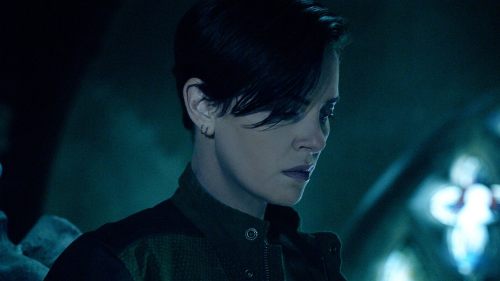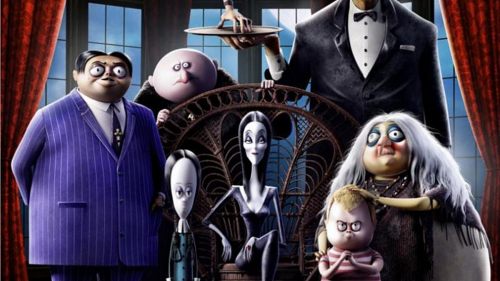Fantasia 2017 Review: Charlize Theron Makes ATOMIC BLONDE Explode
If you’ve been reading about Atomic Blonde, or seen the quote-festooned poster, you know about The Big Scene. The one that those one-sheets refer to as “The Stairwell Scene.” It’s the centerpiece of Atomic Blonde, a lengthy, breathtaking setpiece that follows MI6 agent Lorraine Broughton (Charlize Theron) as she takes on bad guys not only up and down stairwells but into and out of rooms and then to the street and behind the wheel of a moving car. It’s a virtuoso demonstration of Theron’s chops and director David Leitch’s craft, his and his team’s skill at action staging and timing, and at coming up with little beats that, at the movie’s Canadian premiere as part of the Fantasia International Film Festival last night, had the audience bursting into spontaneous applause several times.
The sequence works so well not only due to the technical expertise behind it, but because it’s the point in Atomic Blonde where the situation is simplest and the stakes are clearest. Although it’s being sold on Theron kicking ass, the movie isn’t a nonstop dustup but a spy thriller that’s as much John le Carré as John Wick (Leitch’s previous credit). As often happens in such films, Atomic Blonde (scripted by Kurt Johnstad, from the graphic novel The Coldest City by Antony Johnston and Sam Hart) gets tangled up in its knotty plot, with its shifting alliances and identities, where the plotting gets dense at the expense of deep characterization. Yet by the time The Stairwell Scene arrives, it wouldn’t receive those audience cheers if it was just an exercise in cold technique. Leitch and Theron have gotten us invested with Lorraine as she navigates an unfamiliar landscape populated with untrustworthy figures.
The setting is 1989 Berlin just before the Wall came down, a situation with which the movie doesn’t make as much metaphorical hay as it might. Rather, it’s a colorful, lively backdrop for Lorraine’s mission to retrieve a list of MI6 and CIA operatives that constitutes a major security risk should it fall into the wrong hands. It has already cost one British agent his life, and Lorraine’s attempts to track it down bring her into contact with David Percival (James McAvoy), a section chief with a hedonistic lifestyle and a sideline in illegally dealing Western goods to the locals. He’s also in contact with an East Berliner known only by the code name “Spyglass” (Eddie Marsan), who has memorized the list and is anxious to use that information as leverage to get himself and his family out of his side of the city.
As Lorraine navigates the Berlin underworld with the slippery Percival as her guide, she becomes the target of thugs whom she dispatches in rousing fight scenes, and the lover of Delphine (Sofia Boutella), a French agent on her first assignment who is clearly in over her head. It’s a sex-and-violence cocktail that wouldn’t work as well as it does without an actress as commanding as Theron in the lead. After leaping to the top of the action-star heap with Mad Max: Fury Road, she was a strong presence but didn’t get into the mix enough in The Fate of the Furious; here, she gets a full showcase for both her icy-cool poise and her captivating physicality. She grabs us and keeps us on Lorraine’s side throughout Atomic Blonde, even when the movie doesn’t let us inside her emotions. (The story is framed and interspersed with her post-adventure interrogation by her MI6 boss, played by Toby Jones, and a CIA bigwig played by John Goodman, which seems intended less as exposition than to clue us in on how Lorraine feels about how things went down.)
McAvoy is clearly having contagious fun as the shifty Percival, and everyone else fulfills their functional roles admirably. The behind-the-camera contributions are faultless and evoke the perfect atmosphere; the sex, violence and intrigue are arrestingly shot by cinematographer Jonathan Sela in a mix of decadent neon hues and grubby, contrasty tones. They’re backed by a near-constant soundtrack of Europop and other ’80s songs (often predictable or on-the-nose but nonetheless pleasing choices like “Der Kommissar,” “99 Luftballons,” “London Calling,” etc.), to the point where you wonder if the filmmakers will have any left to use should Lorraine stride into a sequel. Thanks to Theron, you’ll likely leave Atomic Blonde willing to follow her anywhere.



